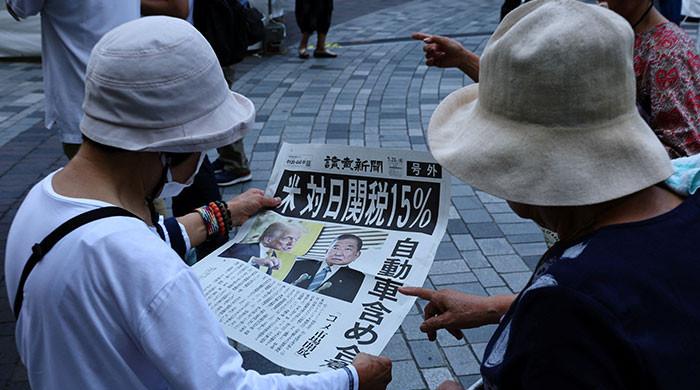- Japanese goods prices are reduced to 15% by 25%
- Japanese actions are jumping, the yen is strengthening against Dollar.
- Tokyo to increase the purchase of American agricultural products.
Washington / Tokyo: The United States and Japan have entered into an agreement to reduce heavy prices, President Donald Trump threatened to impose on the goods of his Asian ally which included a set of $ 550 billion in investment and loans in the United States in Tokyo.
The agreement will bring immediate relief to the critical cars in Japan with existing rates reduced to 15% by 25%, and the samples proposed other Japanese goods which were to arrive on August 1 also reduced to the same amount.
Cars are more than a quarter of all Japan exports to the United States.
“I just signed the biggest trade agreement in history with Japan,” Trump said on his social platform Truth. “This is a very exciting period for the United States of America, and especially for the fact that we will continue to always have an excellent relationship with the country of Japan,” he added.
Ishiba, whom the local media reported will soon resign after an electoral defeat bruised on Sunday, described the agreement “the lowest figure among countries with a trade surplus with the United States”.
The American investment package includes loans and guarantees from Japanese institutions affiliated with government up to $ 550 billion to allow Japanese companies to build resilient supply chains in key sectors such as pharmaceutical and semiconductors, “said Ishiba.
Japan will also increase purchases of agricultural products such as US Rice, said a Trump administration official. Ishiba said the share of rice imports to the United States could increase in its existing framework, but that the agreement “would not sacrifice Japanese agriculture”.
The announcement sparked a rally in Japanese actions, the Nikkei reference climbing 2.6% at its highest level in one year. The actions of car manufacturers have in particular leap, with Toyota more than 11%, and Honda and Nissan have both increased by more than 8%.
The exuberance has also extended to the actions of South Korean car manufacturers, because the agreement in Japan has forced optimism that South Korea could conclude a comparable agreement. The yen has refreshed a little against the dollar, while the term contracts on the European and American actions index rose upwards.
But American car manufacturers have pointed out their dissatisfaction with the agreement, which raises concerns about a commercial scheme that could reduce prices on automobile imports from Japan to 15% while leaving prices on imports from Canada and Mexico at 25%.
“Any agreement that charges a lower price for Japanese imports without practically no American content than the price imposed on North American construction vehicles with high American content is a bad deal for American industry and American car workers,” said Matt Blunt, who directs the American Automotive Policy Council which represents General Motors Ford and Chrysler Parent Stelllantis.
“A better result”
Automobiles are a large part of the American-Japan trade, but almost everything is a way for the United States from Japan, a fact that has long upset Trump. In 2024, the United States imported more than $ 55 billion in vehicles and automotive parts, while just over $ 2 billion was sold on the Japanese United States market.
The bidirectional trade between the two countries totaled nearly $ 230 billion in 2024, Japan with a trade surplus of almost $ 70 billion. Japan is the fifth American commercial partner of goods, according to data from the American census office.
Trump’s announcement followed a meeting with the first price negotiator in Japan, Ryosei Akazawa, at the White House on Tuesday.
“Complete #mission,” wrote Akazawa on X, later claiming that the agreement did not include Japanese steel and aluminum exports which are subject to a price of 25%, nor to any agreement on defense budgets.
The agreement was “a better result” for Japan it could have been, given the previous unilateral price threats from Trump, Kristina Clifton, main economist at Commonwealth Bank of Australia, said in Sydney.
Kazutaka Maeda, economist at Meiji Yasuda Research Institute, said that “with the rate of 15%, I expect the Japanese economy to avoid recession”.
Japan is the largest investor in the United States. With the GPIF pensions giant and Japanese insurers, the country has invested approximately 2 dollars of US markets.
In addition to this, the data from the Bank of Japan show that the Japanese direct investment in the United States was $ 1.2 billion of dollars at the end of 2024, and the Japanese direct investment flows amounted to $ 137 billion in North America last year.
Speaking later at the White House, Trump also expressed a new optimism that Japan would form a joint venture with Washington to support an Alaska pipeline long sought after by its administration.
“We have concluded the only agreement […] And now we are going to conclude another because they form a joint venture with us, in Alaska, as you know, for LNG, “Trump told the legislators to the White House.” They are ready to conclude this agreement now. “”
Trump aids work feverishly to conclude trade agreements before a deadline of August 1 that Trump has repeatedly pushed under pressure from the markets and intense lobbying by the industry. On this date, countries are expected to deal with new steep prices beyond these Trump already imposed since their entry into office in January.
Trump announced framework agreements with Great Britain, Vietnam, Indonesia and has stopped a pricing battle with China, although the details are still to be developed with all these countries.
In the White House, Trump said that European Union negotiators would be in Washington on Wednesday.




